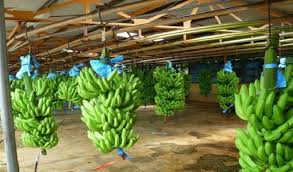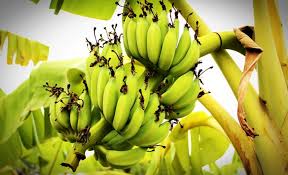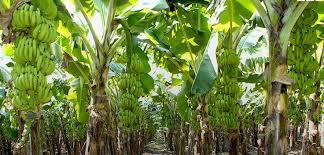How to make millions of Naira plantain farming in Nigeria
Plantains are starchy bananas that makeup one-quarter of the total world production of bananas. Unlike sweet bananas, plantains are a staple food that is fried, baked, boiled (and then sometimes pounded) or roasted, and consumed alone or together with other food. About 70 million people in West and Central Africa are estimated to derive more than one-quarter of their food energy requirements from plantains, making them one of the most important sources of the food energy of the African countries. Due to its variety of uses and high demand, plantain farming is one of the most profitable in the West African markets. Also, plantain farming is very easy to do. In terms of cost per hectare, per ton, and per unit of food energy, plantains are also the cheapest staple crop to produce. Plant
 How to make millions of Naira plantain farming in Nigeria
How to make millions of Naira plantain farming in Nigeria
ains do not have a growing season and are, therefore, available all year round. This makes them a reliable food source as you can always get it whenever it’s needed.
As stated earlier, the plantain business is very lucrative but this is not automatic as there are precautions to be taken and steps to be followed in order to archive success. Because of this singular reason, many farmers might have tried and failed. However, with the necessary requirements in place, the plantain cultivation business can prove to be very lucrative and easy to start-up. It is important to talk about many factors that affect profitability in plantain farming because, as much as this is a very lucrative business as we have rightly stated, going about this business of plantain farming the wrong way can actually erode your profitability and you find yourself in a place where you barely manage to break even. For instance, like rice and sugarcane, plantain is a water-loving crop, and dehydration of the crop induces stunting, poor fruiting, and susceptibility to drought and wasting. Requirements for successful plantain farming include improved varieties of planting materials called suckers; soil fertility; planting spacing know-how; manure application, and most importantly, water application. Furthermore, if a farmer wants good returns on his investments, he should be ready to work on a big farm in the forest ecologies, where rainfalls per annum are very high. This simply means that the environment should not be dry. The crops can be planted at any time in the year, but planting in the middle of the rainy season is a better option because that way, one would be able to produce plantain off-season with irrigation, and sell at higher prices.
Another important issue to consider in order to ensure high profitability is your choice of farmland. For instance, certain states in Nigeria are more favorable and suitable for the cultivation of plantain than other places. The places suitable for plantain farming in Nigeria include all states in the South-East, South-South, and South-West geopolitical zones. Some parts of Kwara, Kogi, Niger, Adamawa, Nasarawa, Taraba, and Zamfara could also grow plantain.
How to grow plantains in Nigeria
In other to ensure you do your plantain business in such a way that you can make millions from it while smiling to the bank every other day, the following are some of the guidelines we have provided:
- Selecting the site
Usually, the emphasis is to be placed on the choice of farmland when plantain is the crop in question. The site should be easily accessible, especially if the establishment of a large field is being planned. It should be well-drained but not too steeply sloped. Plantain cultivation is impossible if the land becomes flooded from time to time, or becomes waterlogged. The soil should be rich in organic matter (black soil). Hence fields in a long natural fallow, under an improved established fallow, or with a lot of mulch are recommended.
- Preparing the field
The farmland to be used for plantain cultivation is to be prepared with minimum disturbance to the soil. In essence, manual clearing should be preferred to mechanical deforestation because bulldozers always remove topsoil with the important organic matter and compact the remaining soil. If perennial cultivation is being considered, planting should be done through mulching. Trees must be cut but the stumps are not to be removed, and the trees should be left to grow again. Also, drains should be dug if some spots in the field tend to waterlog after heavy rains.
 How to make millions of Naira plantain farming in Nigeria
How to make millions of Naira plantain farming in Nigeria
- Spacing
A hectare should contain about 1667 plants with a spacing of 2.5m x 2.5m. Rows should be straight in flat fields to give plants the maximum amount of sunlight. However, on sloping land, rows should follow the contour lines in order to decrease soil erosion.
- Selecting cultivars
For field cultivation, medium plantains should be preferred to giant ones even though giant plantains produce heavier bunches. Giant plantains take longer to produce and are more likely to be damaged by strong winds because of their size. The decision of whether to grow a French or a False Horn plantain cultivar should depend on which type the consumers prefer. Horn plantains should never be cultivated as their yield is very low.
- Preparing suckers
Suckers are to be separated from their mother plant with a spade or machete. The sucker corm must not be damaged or chipped. Consequently, the corm should be carefully peeled with a machete. The pseudostem of the suckers should be cut off a few centimeters above the corm. Peeling of the corm delays the development of nematode infestation, while cutting off the pseudostem reduces bulkiness and improves the early growth of the newly planted sucker.
- Planting
Suckers are planted immediately after field preparation. Plant holes are prepared with a minimum size of about 30cm x 30cm x 30cm. Care should be taken to separate the topsoil from the bottom soil. The sucker is placed in the hole and its corm is covered, first with the topsoil and then with the bottom soil. In the plant hole, the side of the sucker corm which was formerly attached to the corm of its mother plant is placed against the wall of the hole.
- Time to plant
Plantains can be planted throughout the rainy season. However, they should grow vigorously and without stress during the first 3 to 4 months after planting, and therefore they should not be planted during the last months of the rainy season. Planting with the first rains seems agronomically sound but not financially advantageous. Most farmers will plant at the onset of the rains, causing the market to be flooded with bunches 9 to 12 months after planting when prices will be very low. Planting in the middle of the rainy season is a better proposition as plantains will then be produced off-season and get high prices.
Read Also: How to build a multi-million naira cassava processing venture in Nigeria
- Mulching
Organic matter is essential for plantain cultivation if the field is to be very productive for a long time. A high level of organic matter in the soil is beneficial because it stimulates root development, improves soil drainage, decreases soil temperature fluctuations, and increases soil porosity and biological life. Organic matter decays under the influence of microorganisms in the soil, heavy rainfall, and high soil temperature. The amount of organic matter will gradually decrease once the field has been cleared and cause a decrease in yield.
- Fertilizing
To produce a heavy bunch, plantains always need some extra nutrients. These can be applied in the form either of inorganic fertilizers or organic fertilizers (mulch, manure, or ash from wood fires). Inorganic fertilizers have the advantages of easy handling and concentrated nutrients. Organic fertilizers are very bulky, yet they manifest many important characteristics. They improve soil moisture retention, weed and erosion control, soil porosity, and biological activity.
 How to make millions of Naira plantain farming in Nigeria
How to make millions of Naira plantain farming in Nigeria
- Controlling weeds
Plantains should always be weed-free. Weed control starts during field preparation. Weeds are initially controlled about every 6 to 8 weeks; but when the plantain canopy closes, about 5 to 6 months after planting, weed infestation declines due to shading. Any plant with a superficial root system should be considered a weed and therefore eliminated. Grasses or herbs are the most pernicious weeds because they derive their nutrients from the same level of the soil as the plantains.
- Harvesting
The bearing plant is cut and the bunch, 3 to 4 months old, is harvested when 1 or 2 fingertips of the first-hand start yellowing. The bunch usually then ripens within a week. Care has to be taken that the bunch does not drop on the ground when the main plant is cut. The whole of the pseudostem and foliage of the main plant is then chopped (figure 24) and spread over the soil as a mulch for the ratoon crop. If this is not done, weevils may live and multiply on the intact pseudostem.
Marketing plantains to make millions in profits
A study was carried out in Lagos and the average cost of six bunches of plantain was seen at the rate of N7,000, depending on the size of the bunch. From the foregoing, at least 1,667 suckers would be planted on one hectare of land. Assuming a farmer could harvest 1,500 bunches at the end of one year and could sell each at N1000. The total sale would be N1.5 million. The farmer could also sell plantain suckers as planting materials to other farmers. Each grown-up plant would produce a minimum of three suckers, and if he could harvest one sucker from each and could sell at N100, the farmer would make an additional N150,000. The harvest cycles continue for a minimum of four to six years, or more, depending on the land rejuvenation system and farm maintenance practices.
The initial capital invested, including land clearing, planting labor, and cost of suckers should not exceed N300,000, provided he has the land prior to cultivation. And the income potentials estimated above is only a worst-case scenario as a farmer should naturally make way more than that. It is then very clear that plantain farming in Nigeria can make you millions of Naira, simply following this guide.
Hope you enjoy this article?
Share your thoughts in the comment session.
Contact us today for your business consultancy and business advisory services. We can help you fine-tune your idea, structure your business, market your business, train your staff, consult on your retirement plan, coach you for financial success. We also write a business plan and help with fundraising strategies and Grant applications. We can help you start, grow, and expand your business.
Call or WhatsApp us now on 081 0563 6015, 080 7635 9735, 08113205312 or send an email to dayohub@gmail.com and we will solve any of your business problems.
Related